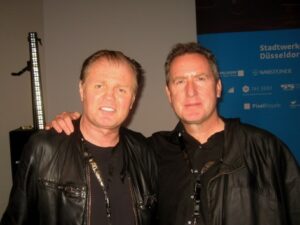
Dance To The Future…
Düsseldorf paid homage to its electronic music history with a three day event of lectures, discussions and live music.
The ELECTRI_CITY_CONFERENCE celebrated the work of pioneers like KRAFTWERK, DAF, RIECHMANN, NEU! and LA DÜSSELDORF, as well as reflecting the city’s worldwide influence on bands such as NEW ORDER, THE HUMAN LEAGUE, DEPECHE MODE, CABARET VOLTAIRE, VISAGE and OMD.
A year in the planning, organisers Rudi Esch and Carsten Siewert assembled an impressive line-up of artists, musicians and academics which read like a ‘Who’s Who?’ of electronic music.
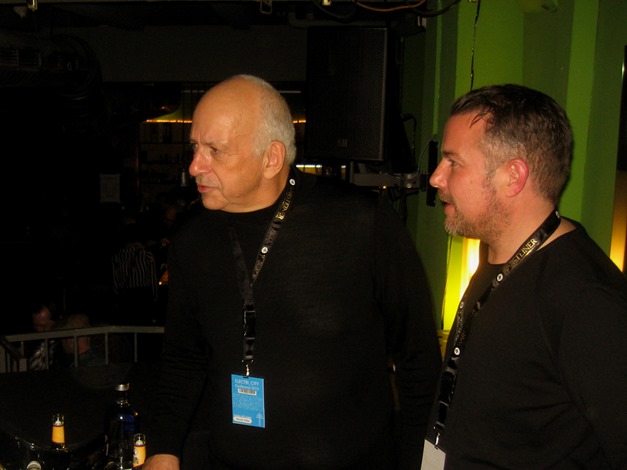
It included names such as Benge, Gabi Delgado, Ralf Dörper, Rusty Egan, Harald Grosskopf, Peter Hook, Stephen Mallinder, Andy McCluskey, Daniel Miller, Mark Reeder, Michael Rother and Martyn Ware.
Also present was Dr Uwe Schütte, whose academic conference ‘Industrielle Volksmusik for the Twenty First Century – Kraftwerk & the Birth of Electronic Music in Germany’ at Aston University helped inspire the seeting up of the event.
While there have been numerous books about Germany and in particular KRAFTWERK, few have been written by people who were actually there at the time. Esch’s own book ‘Electri_City: Elektronische Musik aus Düsseldorf’ was published in 2014 and provided a much needed eyewitness account.
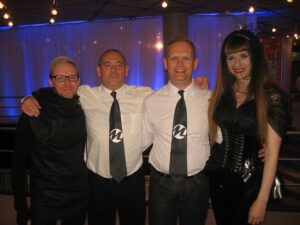
It fully related the Cold War tensions within Der Bundesrepublik that inspired many young Germans into pursuing adventures in art, music and cinema as a matter of self-expression and cultural identity.
The book’s success in Germany provided much of the impetus and momentum to curate this lavish gathering of kindred spirits. The first of the special guests taking part was Peter Hook who talked to Rob Keane about German influences on the UK’s post-punk scene and in particular, JOY DIVISION.
It was Ian Curtis who first introduced the others to KRAFTWERK. After the charismatic vocalist’s passing, the surviving band members became NEW ORDER and as they became more electronic, they acquired five Prophet 5s costing £2000 each.
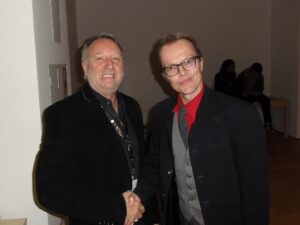
This had only been made possible by the posthumous success of JOY DIVISION.“God bless him, Ian… without him, we wouldn’t have been able to afford these machines to make electronic music…” Hooky said, “what happened in NEW ORDER was as the technology developed, it enabled you to buy the machines that KRAFTWERK were using. I’d love to watch them do something, I really would. Because for all the coverage you get of KRAFTWERK, you never actually know HOW they did it!”
But despite KRAFTWERK being the pioneers of electronic music, Ralf and Florian had been so impressed by ‘Blue Monday’, they arranged to meet its engineer Michael Johnson at Britannia Row Studios where it was recorded. “They wanted to book into the studio we used…” remembered Hooky, “and they wanted to use our engineer, because they wanted their next record to sound like ‘Blue Monday’, which is most ironic because we spent years trying to sound like them!”
KRAFTWERK had a look round Britannia Row but unimpressed with the old fashioned, faded grandeur of the studio, they cancelled the session. “I took that as quite a compliment” quipped the Salford Bass Viking playfully.
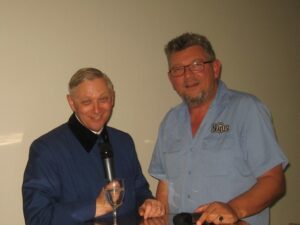
Hooky also reminisced about how he was very impressed by fellow Mancunian Mark Reeder’s mastery of speaking German while on JOY DIVISION’s only visit to Berlin in 1980.
But when he asked how Reeder had become fluent so quickly, the then Factory Records representative in Germany answered: “you can learn any language when you’re starving!”
Mark Reeder himself formed part of panel discussion on the German impact of the Düsseldorf Schule to give his ‘Englishman in Berlin’ point of view. As the man often credited with introducing Italo disco to NEW ORDER, Reeder’s recent film ‘B-Movie – Lust & Sound In West Berlin 1979-1989’ captured the spirit of the divided city and highlighted how a similar document about Düsseldorf would now be quite timely.
The ELECTRI_CITY_CONFERENCE was not just about lectures and talks, but about live music too. Cologne’s EMOTIKON opened proceedings with some incongruous generic pop funk, so it was a welcome relief when HEAVEN 17 took to the stage at Zakk for the sold-out show.
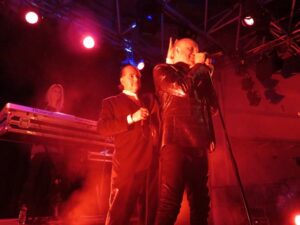
Headlining their first ever concert in the German art capital, HEAVEN 17 gave one of their now famous electronically focussed sets which also featured material that had spawned from THE HUMAN LEAGUE Mk1 when Martyn Ware was a member.
Inviting him to join the band, Phil Oakey remembered how Ware turned up at his house with ‘Trans-Europe Express’ under his arm and told him “Look, we can do this!”. The song that best summed up the occasion was ‘I’m Your Money’, a synthetic train ride with multi-lingual business phrases that captured the essence of a European Union.
To follow a fine performance from HEAVEN 17, Daniel Miller’s aftershow DJ set reflected his influences and subsequent signings for Mute Records to conclude an excellent first day.
With a packed second day, Friday’s numerous academic and theoretical proceedings were concluded with a Krautrock discussion in German by a panel of veteran musicians that included one-time ASHRA member Harald Grosskopf, Michael Rother from NEU! and WALLENSTEIN’s Jürgen Dollase.
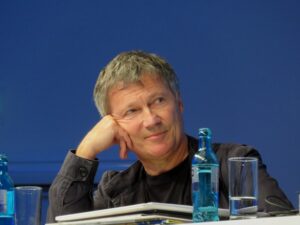
Whereas Germany has usually been associated with purer forms of electronic music, its kosmische outlook has influenced many rock and alternative bands too. However, Dollase’s continual ranting about the joys of LSD proved tiresome and was exemplary evidence to children as to why they shouldn’t do drugs!
The panel was later opened up to questions from the audience so ELECTRICITYCLUB.CO.UK took the opportunity to ask Michael Rother about his first three solo albums.
‘Flammende Herzen’ , ‘Sterntaler’ and ‘Katzenmusik’ were produced by the late Conny Plank and featured CAN’s Jaki Liebezeit on drums. Did he have a favourite?: “I don’t really have favourites, there are individual tracks I enjoy more, it depends on mood and circumstances. It would be unfair really to have a favourite album” Herr Rother replied, “Of course, I try to highlight Conny Plank’s contribution, he was so valuable… we wouldn’t have been able to record NEU! or the second HARMONIA album or my solo albums without Conny, so he’s all over the place in my music… thank you Conny”
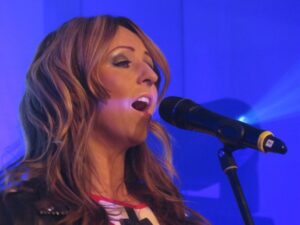
Opening the second evening’s musical line-up, Dublin’s TINY MAGNETIC PETS have been championed by Rusty Egan and their appearance in Düsseldorf was their first in Europe.
The trio’s main strength was their engaging lead singer Paula Gilmer, while Sean Quinn’s synth soloing was also enjoyable. But the occasional rattle of an acoustic drum kit was a distraction and the trio sounded much better when Eugene Somers took to exclusively electronic percussion.
WRANGLER, fronted by Stephen Mallinder who had lectured earlier in the day, delivered a screeching set of dystopian vibes and cold wave mechanics, demonstrating how the Düsseldorf gene has mutated into marvellous pieces such as ‘Lava Land’. Mallinder’s drowning gargoyle vocal was particularly striking within the venue’s effective stereo panning capability.
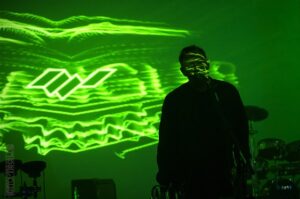
Incidentally, the trio’s incumbent synth collector extraordinaire Benge has recently relocated his MemeTune studio to rural South West of England, in an echo of Conny Plank’s legendary countryside complex which KRAFTWERK, NEU! and LA DÜSSELDORF all recorded in.
Michael Rother delivered a career spanning set of his works including NEU! evergreens like ‘Hallogallo’, ‘Neuschnee’ and ‘Seeland’. There was also the welcome airing of material from his HARMONIA days too. Accompanied by Hans Lampe, formally of LA DÜSSELDORF, the drummer was unbelievably metronomic throughout, providing the hypnotic heartbeat to these much loved numbers. With assistance on bass and synth from a computer, the glorious symphony of ‘Karussell’ from ‘Flammende Herzen’ was a joy to behold. Watching enthusiastically in the crowd was OMD’s Andy McCluskey who remarked in passing to ELECTRICITYCLUB.CO.UK that ‘Flammende Herzen’ was the most played album on his iPod!
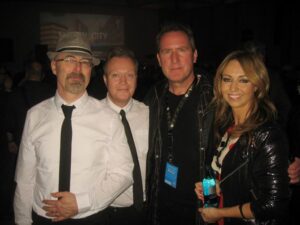
With another fine evening of live music over, proceedings then moved over to the famous club Dr Thompsons for the aftershow party featuring Rusty Egan.
Originally a location for a factory making floor wax, Egan’s DJ set reflected electronic music’s past and present, much to the approval of both TINY MAGNETIC PETS and METROLAND whose tunes got an airing on the dancefloor.
Day three featured SØLYST aka Thomas Klein who warmed up early attendees with an ambient percussive soundtrack that suited the time of day perfectly. Meanwhile, the Rusty Egan vs ELECTRICITYCLUB.CO.UK discussion about the influence of Düsseldorf, Berlin and Bowie on the New Romantics brought up some amusing anecdotes from his Blitz Club and VISAGE days. “KRAFTWERK was all in time!” he retorted in a fascinating and at times, hilarious chat. On DAFT PUNK, he said “The reason why DAFT PUNK wear robot helmets is cos they can’t show their faces… cos THEY STOLE EVERYTHING! But they did it brilliantly!”
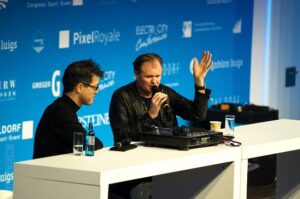
The conversation even turned to THIN LIZZY’s Phil Lynott who frequented the scene and recorded the synth friendly single ‘Yellow Pearl’ co-written with Midge Ure that featured Egan on drums. Also featuring Billy Currie, Egan confirmed that it was a VISAGE song in all but name. ‘Yellow Pearl’ was heavily influenced by LA DÜSSELDORF and was to later gain iconic status as the theme music to ‘Top of the Pops’ from 1981 to 1986, showing just how far reaching the influence of German electronic music had become.
Wolfgang Flür’s now famous video messages on the world wide web have been a delight to many in electronic music circles and in his absence, a special broadcast was prepared by the former KRAFTWERK percussionist for the conference.
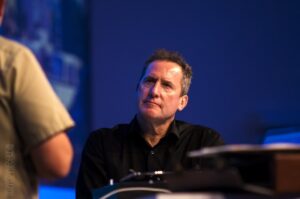
Following on, Andy McCluskey and Rudi Esch presented some light hearted but music fan friendly banter in what was billed as The Electri_City Show. Discussing a variety of records Esch had brought along from his own personal collection, the OMD frontman mentioned how he was a big fan of LA DÜSSELDORF: “Thinking about LA DÜSSELDORF and NEU! – the biggest loss to the scene is Klaus Dinger”. Following his death in 2008, Klaus Dinger was hailed as a legendary drummer, having popularised the Motorik beat.
But as Michael Rother once pointed out, before 2004 nobody cared about NEU! “It’s great that people are thinking about NEU! and LA DÜSSELDORF” said McCluskey, “they should be up there with KRAFTWERK”. However as documented in Esch’s ’Electri_City_Musik_Aus_Düsseldorf’ book, Dinger was known to be a difficult character and that didn’t help his reputation. “It’s the Van Gogh thing” added McCluskey, “you have to bloody die before people think you’re a genius”
Of course, OMD combined various influences to achieve their distinctive template. But what is not often realised is that it is closer to LA DÜSSELDORF than it is to KRAFTWERK, especially on ‘Architecture & Morality’: “It is great that the city of Dusseldorf has woken up to the fact that KRAFTWERK and other musicians changed the world. Whilst KRAFTWERK cement their position in the pantheon of the museums and the books, LA DÜSSELDORF and NEU! were very important. They also did something that was beautiful and different. And OMD unconsciously were combining the two, the electronic sound with the organic…”
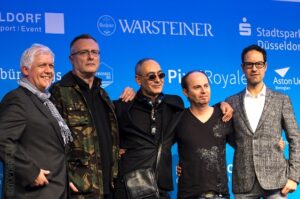
The Techno / Industrial panel in Deutsch fittingly included DAF’s Gabi Delgado and DIE KRUPPS’ Ralf Dörper as well as Ramon Zenker, the man behind FRAGMA. It would be fair to say that neither sub-genre could have had its roots in any country other than Germany. Delgado caused some amusement when he casually lit up a cigarette in the middle of the discussion, reinforcing the rebellious and confrontational aura of DAF.
During the interlude, many went to take a look at the Monster Formant modular synthesizer, owned by local enthusiast Siegfried Brückner, which was being demonstrated in the foyer. Six years in the making and featuring a gobsmacking sixteen VCOs plus many other features too numerous to mention, it was an impressive sight that looked like one of those vintage telephone exchanges.
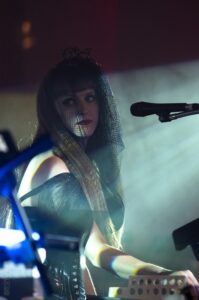
To begin Saturday night’s live music proceedings were Zurich based combo LEN SANDER; their languid style of trip hop has become a favourite of Rusty Egan who also lists LONDON GRAMMAR among his current favourites. They provided a cerebral build before the appearance of two of the most impressive synthesizer duos in Europe at the moment.
With the amount of equipment VILE ELECTRODES possess, they could fill Klingklang itself. Using their more streamlined European touring set-up, the Home Counties couple are now effectively adopted Germans having impressed enough during their tour of Germany supporting OMD in 2013 to land two Schallwelle Awards. Splendid new songs like ‘Pulsar Timing Array’ and ‘Stark White’ from the just released EP were evidence of their continuing progression.
With a more minimalist set-up, METROLAND were the perfect act for the weekend to honour the artistic legacy of Düsseldorf. Their second long player ‘Triadic Ballet’ was a conceptual audio installation themed around das Staatliche Bauhaus. The perfect realisation of Walter Gropius’ theory of uniting art with technology, with a combination of crisp electronics and art school visuals, the Belgian duo gave a wonderful presentation that was appreciated by all those present including Andy McCluskey and Rusty Egan.
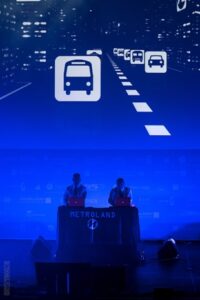
Closing the event, escapist trio DELTA turned out to be the most disappointing of all the bands participating, their landfill indie totally at odds with the weekend’s ethos. Meanwhile Düsseldorf duo BAR fared much better, their synth laden dreampop augmented on occasion by singer Christina Irrgang’s use of a recorder. However, these two acts highlighted the lack of a clear headliner to finish the weekend on a true high.
Overall though, the ELECTRI_CITY_CONFERENCE was fabulous weekend with representation from both sorcerers and apprentices of the Düsseldorf scene. With the English translation of the ’Electri_City_Musik_Aus_Düsseldorf’ book due in 2016, the story of what the city has contributed to the world can only spread further.
French icon Jean-Michel Jarre said recently: “Electronic music has a family, a legacy and a future…” and there was nothing more truer than over these three days by der Rhein.
ELECTRICITYCLUB.CO.UK gives its warmest thanks to Rudi Esch and Carsten Siewert
Additional thanks to Tom Steinseifer, Roger Kamp and Tapio Normall for the use of their photos
‘Electri_City: The Dusseldorf School of Electronic Music’ is due to be published in English by Omnibus Press sometime in 2016
is due to be published in English by Omnibus Press sometime in 2016
The ‘Electri_City – Elektronische_Musik_Aus_Düsseldorf’ compilation is released by Grönland Records.
compilation is released by Grönland Records.
http://www.electricity-conference.com/
https://www.facebook.com/ELECTRICITY.Conference
Text by Chi Ming Lai
Photos by Chi Ming Lai except where credited
8th November 2015
which was recorded as a four piece also featuring Kurt Dahlke, Michael Kemner and Wolfgang Spelman. Delgado returned and DAF moved to London, signing to Mute Records.
became the first full length album to be released by the iconic label in 1980. Allocated the catalogue number STUMM 1 at the suggestion of DAF as “stumm” was the German word for “mute”, it was a mixed studio and live affair with Delgado demonstrating his aggressive vocal ability with grief stricken screams on raucous punky pieces that barely clocked in at two minutes!
in 1981 featured their fierce breakthrough track ‘Der Mussolini’ which flirted with right wing imagery in its sardonic reflections on ideology. However, combined with DAF’s preference for a militaristic aesthetic, it caused controversy and confused observers, attracting a following which Delgado hated; after all, his parents had escaped from the Franco regime in Spain. But DAF liked to shock and Delgado was always unapologetic about the provocation within his lyrics.
and ‘Für Immer’
maintained the industrial standard with the latter’s highlight being a re-recording of a 1980 Mute ‘Kebab Träume’. Transformed into something much heavier, the memorable if controversial line “Deutschland, Deutschland, alles ist vorbei!” threw more wood onto the provocation bonfire. But despite the fame, all was not well within DAF and the pair fell out under a haze of sex, drugs and sequencer…
.
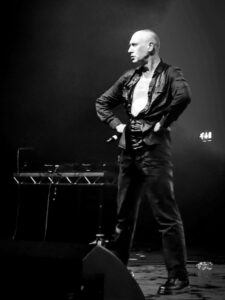 Stephan Groth of APOPTYGMA BERZERK said “DAF was one of the HUGE inspirations in the early APOP days, and we’ve had nothing but respect and admiration for their output through the years… Gabi, you will stay in our memory ‘Für Immer’. RIP”
Stephan Groth of APOPTYGMA BERZERK said “DAF was one of the HUGE inspirations in the early APOP days, and we’ve had nothing but respect and admiration for their output through the years… Gabi, you will stay in our memory ‘Für Immer’. RIP”
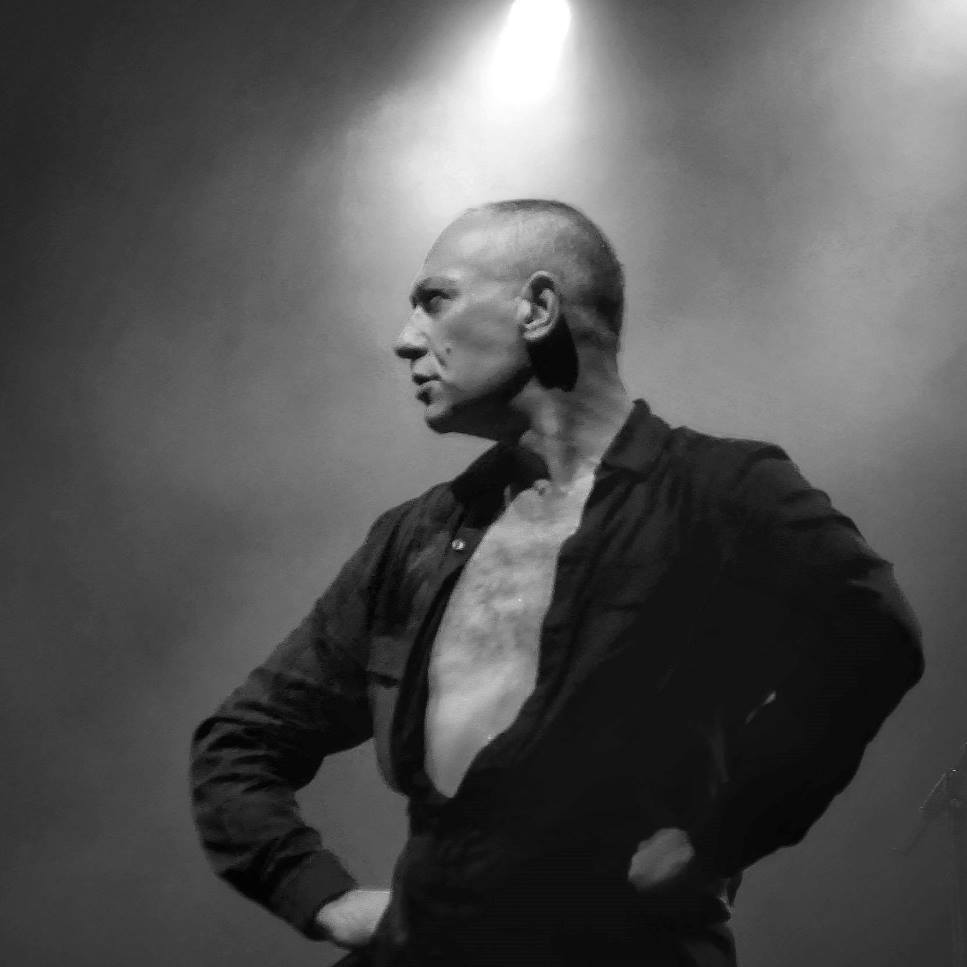















Follow Us!